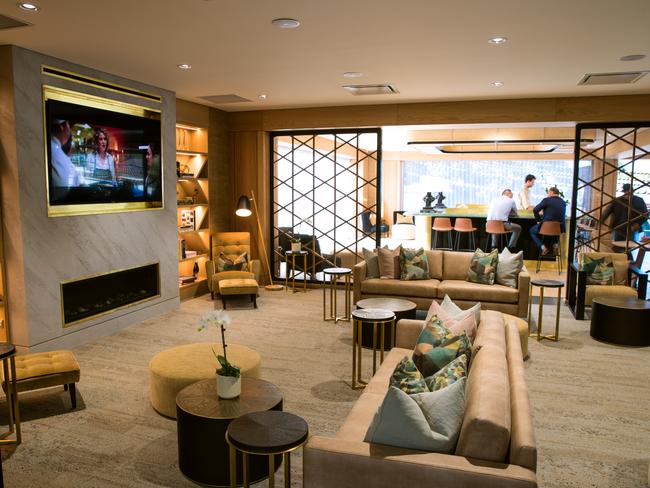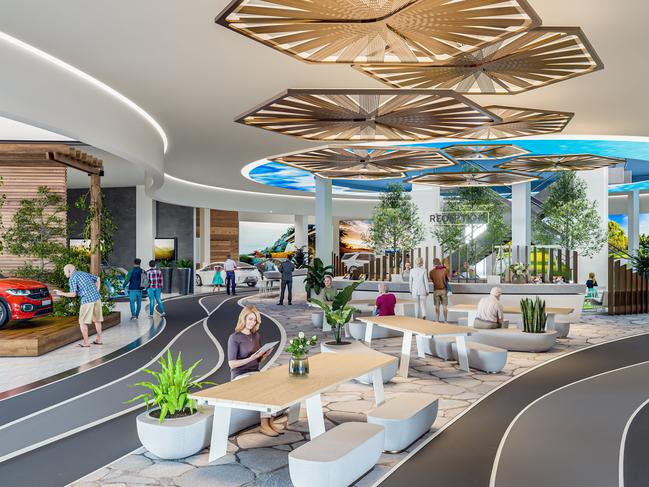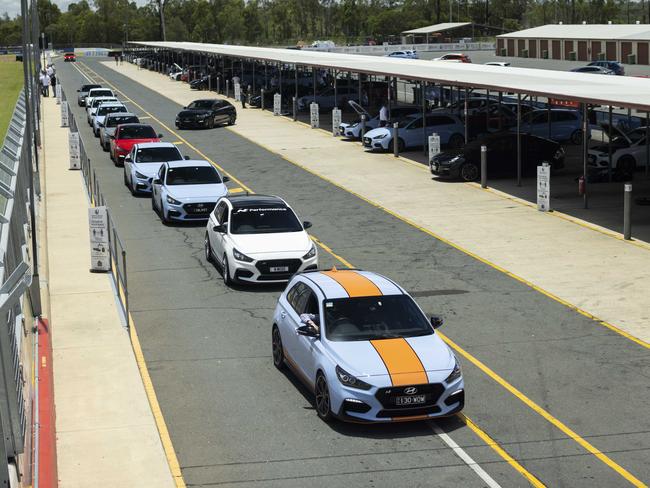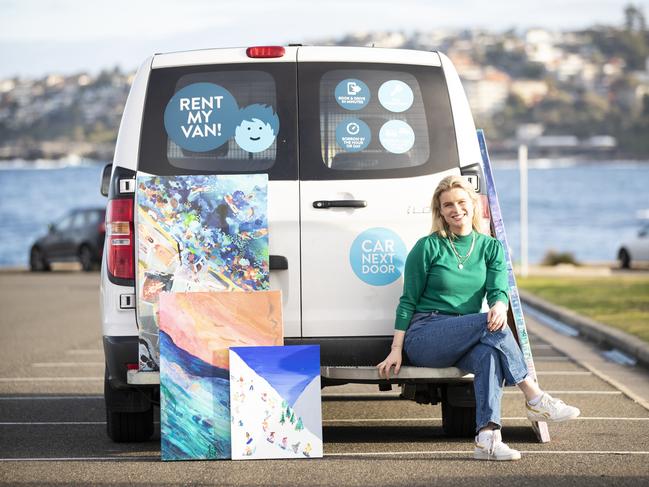Buying a car in Australia: Radical changes coming to how Aussies buy and use cars
Car makers are experimenting with new ways to win customers as the motor industry undergoes a revolution in how Australians buy and use cars.
High-pressure salespeople, awkward haggling and helium balloons are giving way to race tracks, teppanyaki and loyalty rewards as the motor industry undergoes a revolution in how Australians buy and use cars.
Car makers are experimenting with new ways to win customers including online ordering, no-haggle pricing, pop-up showrooms and a program that lets buyers swap their hatchback for an SUV when they go on holiday.
Automotive industry consultant Ben Sullivan said dealerships are reworking “an antiquated business model that the consumer is turning away from”. The focus now is on people enjoying the buying experience rather than kicking tyres and thrashing out deals in car lots.
“The industry is its own worst enemy,” Mr Sullivan said.

“What we are watching is the industry reluctantly trying to address some longstanding issues with the way cars are retailed in the context of shifting consumer expectations.”
Hassle-free electronics purchases and Netflix-style subscriptions are influencing some manufacturers’ new sales tactics, while for others it’s about making the customer king.
Luxury dealerships such as the new Lexus showroom in Chatswood, Sydney, are going beyond water coolers and free Wi-Fi to replicate first-class airline lounges with expensive decor, baristas, chefs and Japanese cuisine.
The manufacturer is also offering an airline-style “Encore Platinum” rewards program that allows owners to book a complimentary car for a holiday in New Zealand. Owners are likely to be able to book the car for up to eight days, mimicking its Australian offering.
As they grapple to engage with younger buyers, some car makers are looking at cutting out the dealership experience altogether. At the other end of the extreme, at least one dealer group is fighting back by building two mega-dealerships where buyers can shop one brand against another under the same roof.
Brisbane dealer group AP Eagers will open a huge “auto mall” in 2024.


More than a dozen brands will share a space combining showrooms with a restaurant, racetrack, driver training facility and more.
Chief executive Keith Thornton said customers would be able to test-drive performance cars under lights at more than 200km/h, or get hands-on experience with new safety tech in a controlled environment.
“They’re things you can’t do at home that are highly appealing to the enthusiast and also highly applicable to people as they experience new technology.
“This will be something people will go to even when they are not in the market for a car.”
The dealer group also plans to take over a multi-floor space alongside Myer and David Jones at Brisbane’s Indooroopilly Mall this year, where shoppers will be able to check out new models or have their car serviced without visiting a conventional dealership.
But for other dealers, the future is becoming uncertain, as more car companies experiment with dealing direct with the public.
Genesis, Hyundai’s luxury arm, established a multimillion-dollar studio in Sydney’s Pitt Street Mall before expanding to the Emporium Melbourne shopping centre.
The manufacturer is trying to rework the way people buy cars, delivering them directly to customers for test drives, collecting vehicles remotely for service work and operating a “no haggle” policy with sales staff.
Tesla’s explosive growth in Australia follows a similarly fuss-free approach. The car’s price is fixed, with no room for negotiation and a no-frills approach to servicing.
Other car makers are following suit.
Honda will start selling direct to the public next month while Mercedes is planning to launch a similar scheme in the new year. Volkswagen’s new Cupra brand will follow a similar path when it launches next year.

Jason Nomikos, director of customer management for Mercedes’ regional arm, said customers did not enjoy negotiating prices with sales staff.
“It’s not often a pleasant experience for many, if not most customers,” he said
Honda boss Stephen Collins said the brand’s research showed that haggling was “one of the most common pain points associated with the purchase of a new car”.
He expects many customers to welcome the change, even if they might end up paying a little more
“Under our new agency model, this will no longer be necessary to determine the price of a new vehicle, which is a significant change for Australians who have been trained to buy new vehicles by negotiation.
“We know this new way of buying a car won’t be for everybody, but we are confident it will address the needs of the vast majority of new car buyers, while delivering a more relational, less transactional experience.”
Mr Sullivan said it might be difficult to get customers to adjust to new models.
“There’s a natural suspicion that you might be being ripped off,” he said.
“We’ve trained people to haggle so getting rid of the haggling might be a bit tricky.
“Customers find [the current car sales process] so unfair because it so lacks transparency.”
RENT A CAR FROM THE MAKER
As big auto brands adapt to evolving transport trends, Toyota has launched a new car-sharing program called Kinto that lets users swap models according to their needs.
The program allows people to rent a Toyota directly from the company for an hour, day or week for a flat fee and kilometre charge that includes insurance and roadside assistance.
For example a Toyota RAV4 SUV costs $12.35 per hour with an additional 40 cents per km. It gets progressively cheaper the longer you rent it, costing $85.50 for 24 hours with an additional 36 cents per km charge or $399 plus 24 cents per km driven for a full week.
Mark Ramsay, GM of Toyota Finance Australia, said the program was part of the company’s goal to become a global mobility services brand.
“For us here it’s a fully digital business, something different than we’ve done before. To enable us to have flexible, affordable and easy access to Toyota vehicles,” said Mr Ramsay.
Users can rent almost anything in Toyota’s range, according to Ramsay.
“On a Tuesday you could be in a Yaris, and the rest of the week something else and on the weekend a HiLux or Hiace to move home or go to Bunnings,” he said.
Initially the service is launching in inner city Melbourne and in several regional towns, but the expectation is that in the coming months there will be more locations and much wider access by the end of the year.
Toyota isn’t the first company to do on-demand car sharing. GoGet with its conveniently located banks of cars in most major cities has been the industry stayer.
‘DON’T NEED TO OWN A CAR’
Bronte Goodieson is an avid user of Car Next Door, a peer-to-peer sharing service that allows average Aussies to rent out their cars when they aren’t being used.
The illustrator and artist from Sydney’s eastern suburbs sold her car after moving out and because parking in the densely populated eastern beaches was too much of a headache.
Goodieson, 27, often rents a van on Car Next Door for short periods to deliver her oversized artwork or set up a market stall. And she is happy using Uber or catching the bus most of the time.
“I don’t know if I’d own a car again,” said Goodieson. “Where I live now there is no need but if I moved somewhere without public transport then I probably would.”
Car Next Door doesn’t charge monthly membership and all the car costs are included in a flat fee.

It is a fairly affordable service with options across several price ranges. A 2020 Toyota RAV4 SUV will roughly cost users $12 an hour plus a 33 cent km charge or about $70.00 and the same per km charge for the day.
The brand’s boss, Will Davies, said some owners can earn up to $1500 a month, while the average owner makes about $450.
“It’s the new technology that is coming and replacing the need to have a $20,000 chunk of metal sitting outside of your house that only gets used four per cent of the time,” said Davies.
Davies said the way Australians get around is changing and peer-to-peer sharing is just one piece of the puzzle along with Uber, easily accessible public transport apps and even electric bikes and scooters.
Big car makers are taking notice. Hyundai has been an investor in Car Next Door as it looks to carve out a slice of the future mobility pie.
“All of these big car companies can see that change is happening and there is potential for their existing business models to be highly disrupted. It’s very hard for big organisations to innovate at great speed so I think the idea of Hyundai investing in Car Next Door is a very appealing one for them,” said Davies.
More Coverage
Originally published as Buying a car in Australia: Radical changes coming to how Aussies buy and use cars




